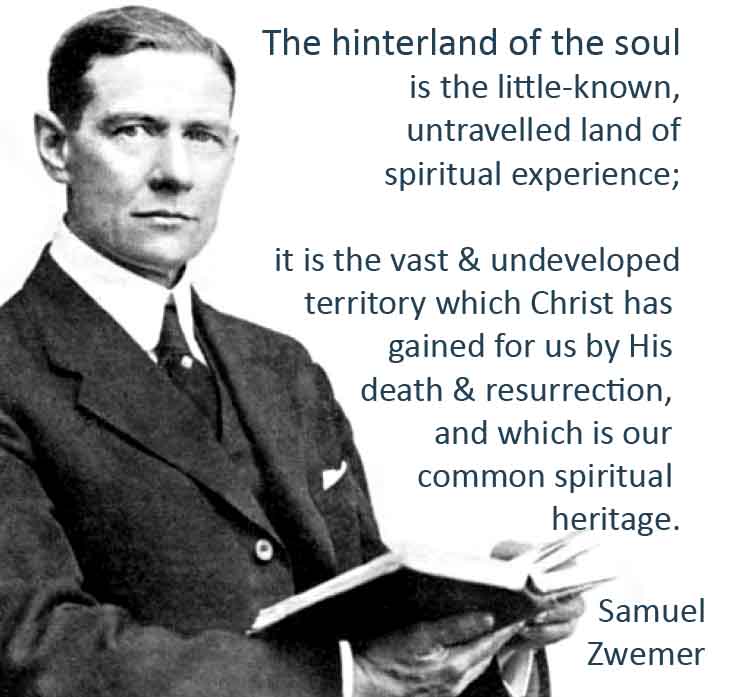 Samuel Marinus Zwemer (1867-1952) was born this day, April 12. Zwemer has been called “the Apostle to Islam” by many people, including a historian of missions as great Kenneth Scott Latourette. He worked in frontier missions in a variety of ways, willing to go anywhere there were Muslims and to use any technique that was in keeping with his high principles: direct personal witness, platform speaking, literature distribution, scholarly argument, tent-making, training local believers, and more.
Samuel Marinus Zwemer (1867-1952) was born this day, April 12. Zwemer has been called “the Apostle to Islam” by many people, including a historian of missions as great Kenneth Scott Latourette. He worked in frontier missions in a variety of ways, willing to go anywhere there were Muslims and to use any technique that was in keeping with his high principles: direct personal witness, platform speaking, literature distribution, scholarly argument, tent-making, training local believers, and more.
By some counts, Zwemer’s own frontier evangelistic labors only resulted in a handful of converts. But in addition to that work, Zwemer carried out a ministry of writing and encouragement that had worldwide influence that is still ongoing. He wrote many books and articles, spoke at all the major evangelical hot spots (Keswick, Northfield, etc.) and in numerous mainline denominational settings worldwide. He was the founding editor of The Moslem World journal, and from 1929 to 1951 he was professor of Missions and the History of Religions at Princeton Theological Seminary.
Because of his age and credibility, Zwemer managed to stay above the fray of the fundamentalist-modernist controversy of the 1920s, maintaining definite conservative positions while ministering in a wide variety of settings. But when the big Protestant establishment in the United States began aggressively re-describing their overseas work as something much kinder and gentler than actually seeking to invite people to become Christians, Zwemer took a stand for a traditional understanding of missions. In response to the 1932 book Re-Thinking Missions: A Laymens Inquiry After One Hundred Years produced by an ecumenical committee, Zwemer published his back-to-basics book Thinking Missions with Christ. Where Re-Thinking Missions sought to redefine missions as “preparation for world unity in civilization” through inter-religious dialogue, Zwemer argued that the real business of missions was to preach Christ crucified.
Zwemer was never much of a polemicist, but he hit back hard at this challenge. Part of his objection was to the abuse of words involved in giving the name “missions” to the modern secular quest for global order. “Christian terms have a Christian lineage that should not be heedlessly disregarded. There is a flavor about old and well loved words that makes one hesitate to adopt substitutes without good reason. A new word cannot easily be filled with the historic and characteristic content of the old.”
Zwemer chose an interesting case study for this principle (see p. 26 of Thinking Missions): The word “sharing,” which was novel back then.
“Sharing” is a modern word in the modernized vocabulary of missions. Though in itself a good word with an honorable history, it has begun to usurp the place of ideas and ideals that are vitally related to the work of evangelism.
In particular, the Re-Thinking Missions report had recommended that “evangelism” was only appropriate terminology for reaching secular people, while the approach to believes in other religions was not so much evangelism as dialogue, or mutually respectful sharing. Zwemer replied:
We believe this is loose thinking and is due to lack of discrimination in the use of the word sharing. The use of this word without careful definition is to be deprecated for four reasons: It is not Scriptural; it is subject to many and very loose interpretations; its careless use shifts the very basis and aim of Christian missions; and the idea of sharing our human thought and experience is not the central idea of evangelism.
“To share the Gospel is not biblical terminology.” That noun and that verb do not belong together in the minds of the apostles. Zwemer makes his case with reference to the words used in the Bible about the gospel (bashara, diagello, katagello, evangelizo, kerusso), and then applies the test of substituting “share” in key passages:
They repented at the sharing of Jonah.
It pleased God by the foolishness of sharing to save them that believe.
How shall they share except they be sent?
And so on, reductio ad absurdum. But Zwemer is not just an old crank, griping about newfangled terminology (“Kids these days, sharing the gospel, harumph!”). He rightly saw the use of the word “share” as a signal of the crisis of confidence in Protestant missions. He picked it as a telling symptom, and wrote about it to draw attention to the real problem. But his main line of battle was to prepare and send more missionaries, with better doctrinal training, into the field. He knew the deep Christian past, and he had his eye on the future through ministry to the young in his generation.
The churches today should listen to this old Zwemer. Of course he sounds dated and politically incorrect in a hundred ways (one of his best books starts with the howler, “To the Oriential the girdle is everything because it is indispensable”)
What to Read: Of all his books, Zwemer’s favorites were the trilogy on the life of Christ: The Glory of the Manger, The Glory of the Cross, and The Glory of the Empty Tomb. You can pick those out for seasonal reading at Christmas and Easter. My favorite of his books (I certainly have not read them all!) is The Solitary Throne, a collection of addresses he delivered at Keswick in 1937, especially the classic chapter on “The Hinterland of the Soul.”
Where to read it: Zwemer’s books were digitized long before Google books, for efficient transmission to those who need them most: Check out here for most of his stuff.
